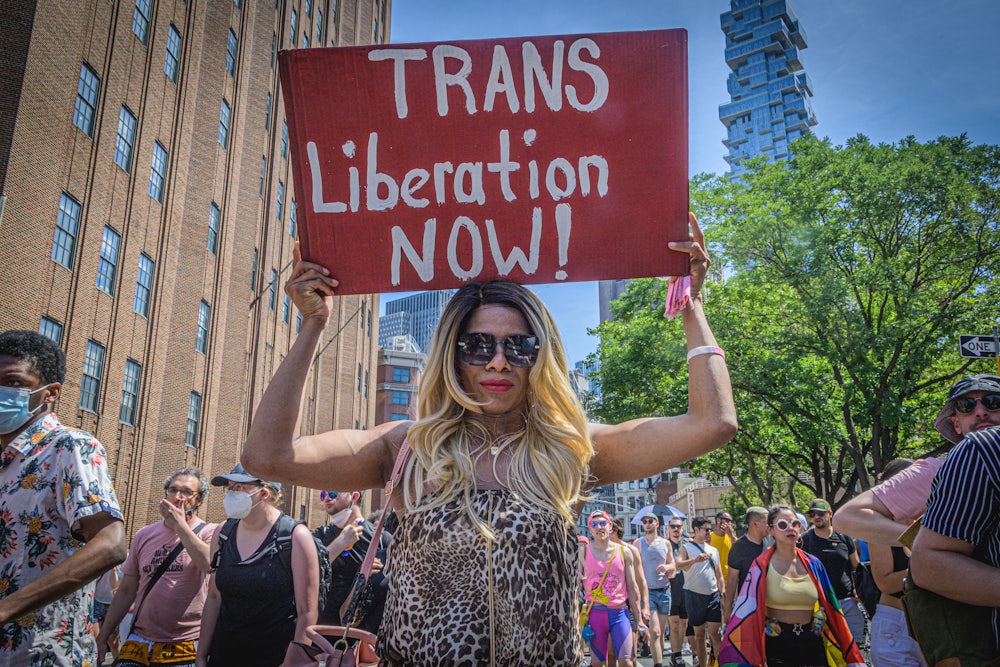Pamela Paul, until recently the longtime editor of The New York Times Book Review, has only been a columnist on the paper’s Opinion desk for a matter of months. Yet she’s already made a name for herself, with just-asking-questions essays meant to expose those twinned, supposed scourges of the left, cancel culture and identity politics (questions that have already been asked, a lot). Having thus transitioned to the paper’s most agenda-setting perch, Paul is now laying the groundwork for a mainstream case for trans exclusion.
Her latest essay, published on Sunday, makes no original arguments in its assemblage of trans-exclusionary and anti-trans talking points—you can find painfully similar ones in Ms. and The Nation. But Paul remakes their case to a much bigger audience: The reason women are losing their rights is because no one knows what a woman is anymore, due to the existence of women who are trans. This claim is framed, dangerously, as an incitement to confront extreme beliefs—the piece is provocatively titled “The Far Right and Far Left Agree on One Thing: Women Don’t Count”—when in fact it’s a polite version of an extreme belief itself: that trans people are a powerful threat to women and womanhood. Now that the Times is presenting this notion to its largely liberal readers, we can expect to see a wider acceptance of such arguments in many other “respectable” outlets.
In her column, Paul claims that a “misogynist agenda” animates trans inclusion in both the policy and politics of reproductive health—that those who advocate for the reproductive rights of trans men and nonbinary people are “reducing women to a mix of body parts and gender stereotypes.” She cites a colleague to argue that it has been “reported” that “even the word ‘women’ has become verboten.” Women are the most threatened of all, she writes, and yet the response from the left is to “shove women to the side,” to argue that “women as a biological category don’t exist.” Not brave enough to put her own voice to the claim, Paul writes, “Some might even call this kind of thing erasure.”
It should be quite obvious to anyone involved in, or even merely reporting on, the movement to defend abortion rights that the word “woman” has not been erased, much less women themselves. To claim as much is to repeat anti-trans talking points from gender-critical activists as well as the right. Two examples of alleged erasure that Paul uses in her Times piece were cited last year by the Heritage Foundation—one involving the cover image of the medical journal The Lancet, the other a tweet from the American Civil Liberties Union. The same few examples recur in other hand-wringing essays of Paul’s type, suggesting either hackiness on the part of the writers or, perhaps, that there aren’t real examples of women being “erased.” Either way, the result is lightly laundered anti-trans propaganda, presented as a sensible centrist argument.
If the Times is looking for a familiar both-sides frame in which to slot trans rights, the Republican Party has one side ready in its wave of legislation targeting trans and nonbinary kids, alongside the far right’s mobilization around the “grooming” moral panic. The results of the right’s multipronged anti-trans efforts, from state legislatures to street violence, are obvious and harrowing. Mothers of trans children have been forced to take legal action to defend themselves from Republican officials who deem their affirmation of their kids to be child abuse. Pride events across the country were threatened and mobbed by groups like the Proud Boys; various Christian nationalist figures; and, notably in Idaho, 31 members of Patriot Front. So why not adopt the very straightforward counterpoint, rejecting violence and affirming the dignity of trans kids? It does not seem to be so difficult to stand opposite a militia group storming a Pride celebration in a park. But Paul doesn’t mention any of this.
What motivates the line Paul takes—as her argument is hardly new—is the moment. As much of the right was celebrating the collapse of abortion rights with the Supreme Court’s Dobbs ruling in late June, it was also already repurposing the same tactics to attack trans people that it had used to attack women’s rights and criminalize abortion: advancing increasingly strict and inhumane legislation in statehouses across the country and scapegoating trans people with propaganda that encourages violence against them. After Dobbs, the state of Alabama borrowed the ruling’s logic, asking a federal appeals court to allow it to enforce its felony ban on providing hormone therapy or puberty blockers. The right, plainly, sees this as all the same fight.
It is into this moment that certain self-proclaimed defenders of women’s rights enter with their concerns about their imaginary “erasure,” as violence directed at both LGBTQ rights and abortion rights defenders is reportedly escalating. Direct action for abortion rights is being labeled “terrorism” by Representative Marjorie Taylor Greene and Facebook. Patriot Front members reemerged in Boston for Independence Day, under the banners “Strong Families Make Strong Nations” and “Reclaim America.” As law professor Melissa Murray noted, “If you don’t see the connection between the assault on reproductive rights and ethno-nationalism, you’re not paying attention.” Kelly Hayes at Truthout extended the connection: “The fact that we see cis women who are actively losing their rights joining in on attacks on trans people, and scapegoating them, as eliminationist policies are pursued at the state level in red states around the country, should be historically horrifying to people.”
Perversely, Pamela Paul sees the end of Roe as the ideal moment to take her megaphone—one far more sizable than anti-trans feminists’—and direct it at trans people. This is a notable turning point: when roughly half the people in America, many of them reeling from being robbed of something they were told was their birthright, were told by one rarefied columnist at the country’s most powerful newspaper that trans women are set to replace them. Some may call that fascist. I do.






